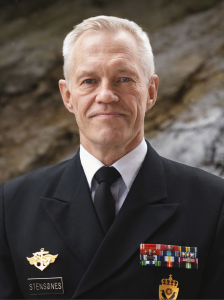Vice Admiral Nils Andreas Stensønes, Director Norwegian Intelligence Service, presents The Norwegian Intelligence Service’s annual report Focus: Norway faces an increasingly challenging security situation. Over the past year, tensions have been rising between Russia and China on the one hand and the West on the other; they will continue to do so in the year ahead.
The conditions for international cooperat ion have deteriorated significantly, which has led to escalation of established conflicts, a spiralling arms race between the great powers and a heightened terrorist threat.

President Vladimir Putin will continue waging war in Ukraine in 2025. Although developments are slowly moving in Russia’s favour, the cost of the war is high. There are currently no signs of regime instability in Moscow, even though the country’s capacity to wage war is gradually diminishing. Nevertheless, the outcome of the war depends predominantly on the West’s willingness and ability to support Ukraine militarily.
A Russian victory in Ukraine would strengthen the Kremlin’s belief in offensive military force as a useful tool for promoting its authoritarian and expansionist policies. This, in turn, would increase the threat to Europe. States located in Russia’s self-proclaimed sphere of interest would be especially vulnerable. Russia considers Norway part of an unfriendly West.
China and Russia are cooperating more closely, and Moscow has become increasingly dependent on this cooperation. Although Beijing wants to maintain its economic collaboration with Western countries, it is preparing for the possibility that rising conflict levels could cause a breakdown in relations and confrontations with the West.
The conflicts in the Middle East have caused a significant shift in power; a weakening of the actors in the Iran-led axis of resistance, combined with the Assad regime’s collapse in Syria, has weakened Iran’s position. Both the Middle East and Africa will remain riddled with conflict in 2025. Conflicts here heighten the terrorist threat to Europe. Overall, the fronts are hardening between the West and authoritarian states that seek to undermine Western influence in the international system. This is detrimental to international cooperat ion and leaves a growing number of conflicts unresolved. The Norwegian Intelligence Service’s main mission is to warn against threats to Norway and Norwegian interests. Focus is the Norwegian Intelligence Service’s annual unclassified threat assessment. Our aim is to describe threat actors and developments that we consider important to Norway’s security in the coming year.
Follow this link in order to read the full report
This is NIS: The Norwegian Intelligence Service (NIS) is Norway’s foreign intelligence service. Although subordinate to the Norwegian Chief of Defence, NIS does not concern itself exclusively with military matters. The main tasks of NIS are to warn of external threats to Norway and high-priority Norwegian interests, to support the Norwegian Armed Forces and the defence alliances Norway is part of, and to assist in political decision-making processes by providing information of significance to Norwegian foreign, security and defence policy. In the annual threat assessment ‘Focus’, NIS presents its analysis of the current situation and expected developments in geographic and thematic areas considered particularly relevant to Norwegian security and national interests.
